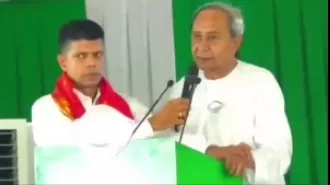Dozens hospitalized in Georgia during protests over halted EU negotiations.
44 people hospitalized after third night of protests in Georgian capital against government's decision to suspend EU negotiations.
December 2nd 2024.

In a scene of chaos and tension, demonstrators in Tbilisi, Georgia clashed with police during a rally against the government's decision to suspend negotiations on joining the European Union for a period of four years. This incident took place outside the parliament building in the early hours of Sunday, December 1st, 2024.
According to officials, this was the third night of protests in the Georgian capital, with the previous two nights also witnessing violent clashes between protesters and law enforcement. The latest demonstration left a total of 44 people hospitalized, indicating the intensity and scale of the situation.
As tens of thousands of demonstrators gathered outside the parliament on Saturday night, they resorted to throwing stones and setting off firecrackers, while the police responded with water cannons and tear gas. In a symbolic gesture, an effigy of Bidzina Ivanishvili, the founder of the ruling Georgian Dream party, was burned in front of the legislature. Ivanishvili, a wealthy businessman with ties to Russia, has been a controversial figure in Georgian politics.
The Interior Ministry of Georgia reported that 27 protesters, 16 police officers, and one media worker were among those hospitalized. In response to the violent protests, Prime Minister Irakli Kobakhidze issued a warning, stating that any violation of the law would be dealt with severely. He also emphasized that politicians who incite violence and hide behind their offices will not be exempt from responsibility.
At a briefing on Sunday, Kobakhidze refuted claims that Georgia's European integration had been halted. He clarified that the government's decision was aimed at rejecting the "shameful and offensive blackmail" which was hindering the country's progress towards EU accession. This announcement came shortly after the European Parliament criticized Georgia's recent general election as being neither free nor fair.
Kobakhidze also dismissed the statement released by the U.S. State Department on Saturday, in which they announced the suspension of their strategic partnership with Georgia. The statement condemned Georgia's decision to halt its efforts towards EU accession. Kobakhidze viewed this as an attempt by the outgoing administration to create difficulties for the incoming administration. He stated that this would not have any significant impact and that they would discuss the matter with the new administration.
Furthermore, it was confirmed that Georgia's ambassador to the U.S., David Zalkaliani, had resigned amidst the ongoing protests. The EU's foreign policy chief Kaja Kallas and enlargement commissioner Marta Kos released a joint statement on Sunday, expressing their concerns over the Georgian government's decision to suspend negotiations. They also urged the authorities to respect the right to freedom of assembly and expression, and to refrain from using force against peaceful protesters, politicians, and members of the media.
The ruling Georgian Dream party's controversial victory in the parliamentary election held on October 26th, 2024, has triggered nationwide protests and an opposition boycott of parliament. The opposition has alleged that the election was rigged with the help of Russia, which has a history of exerting its influence over Georgia.
President Salome Zourabichvili, who is known for her pro-Western stance, spoke to the Associated Press on Saturday, expressing her concerns over the current situation in Georgia. She stated that the country was at risk of becoming a "quasi-Russian" state, with the ruling party having a stronghold over major institutions. Zourabichvili stressed that the opposition was not seeking a revolution but calling for new elections under fair and transparent conditions.
Despite being granted candidate status in 2023, the EU has put Georgia's accession on hold and reduced financial support after the passing of a controversial "foreign influence" law earlier this year. This law was widely condemned for being a threat to democratic freedoms.
According to officials, this was the third night of protests in the Georgian capital, with the previous two nights also witnessing violent clashes between protesters and law enforcement. The latest demonstration left a total of 44 people hospitalized, indicating the intensity and scale of the situation.
As tens of thousands of demonstrators gathered outside the parliament on Saturday night, they resorted to throwing stones and setting off firecrackers, while the police responded with water cannons and tear gas. In a symbolic gesture, an effigy of Bidzina Ivanishvili, the founder of the ruling Georgian Dream party, was burned in front of the legislature. Ivanishvili, a wealthy businessman with ties to Russia, has been a controversial figure in Georgian politics.
The Interior Ministry of Georgia reported that 27 protesters, 16 police officers, and one media worker were among those hospitalized. In response to the violent protests, Prime Minister Irakli Kobakhidze issued a warning, stating that any violation of the law would be dealt with severely. He also emphasized that politicians who incite violence and hide behind their offices will not be exempt from responsibility.
At a briefing on Sunday, Kobakhidze refuted claims that Georgia's European integration had been halted. He clarified that the government's decision was aimed at rejecting the "shameful and offensive blackmail" which was hindering the country's progress towards EU accession. This announcement came shortly after the European Parliament criticized Georgia's recent general election as being neither free nor fair.
Kobakhidze also dismissed the statement released by the U.S. State Department on Saturday, in which they announced the suspension of their strategic partnership with Georgia. The statement condemned Georgia's decision to halt its efforts towards EU accession. Kobakhidze viewed this as an attempt by the outgoing administration to create difficulties for the incoming administration. He stated that this would not have any significant impact and that they would discuss the matter with the new administration.
Furthermore, it was confirmed that Georgia's ambassador to the U.S., David Zalkaliani, had resigned amidst the ongoing protests. The EU's foreign policy chief Kaja Kallas and enlargement commissioner Marta Kos released a joint statement on Sunday, expressing their concerns over the Georgian government's decision to suspend negotiations. They also urged the authorities to respect the right to freedom of assembly and expression, and to refrain from using force against peaceful protesters, politicians, and members of the media.
The ruling Georgian Dream party's controversial victory in the parliamentary election held on October 26th, 2024, has triggered nationwide protests and an opposition boycott of parliament. The opposition has alleged that the election was rigged with the help of Russia, which has a history of exerting its influence over Georgia.
President Salome Zourabichvili, who is known for her pro-Western stance, spoke to the Associated Press on Saturday, expressing her concerns over the current situation in Georgia. She stated that the country was at risk of becoming a "quasi-Russian" state, with the ruling party having a stronghold over major institutions. Zourabichvili stressed that the opposition was not seeking a revolution but calling for new elections under fair and transparent conditions.
Despite being granted candidate status in 2023, the EU has put Georgia's accession on hold and reduced financial support after the passing of a controversial "foreign influence" law earlier this year. This law was widely condemned for being a threat to democratic freedoms.
[This article has been trending online recently and has been generated with AI. Your feed is customized.]
[Generative AI is experimental.]
0
0
Submit Comment





